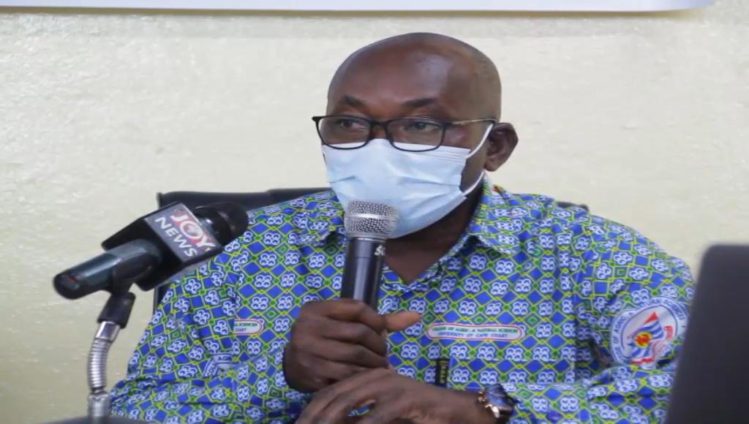Crop scientists and researchers across the country have been counting the losses of the crop sector after the COVID-19 affected and modified the normal supply chain of horticultural produce.
The scientists say the delayed delivery of Agric inputs, lack of arrival of seasonal labour and non-harvesting of cases as a result of quarantine measures and other restrictions led to several losses in the horticultural sub-sector.
Speaking at the Annual General Meeting of Horticulturalists at the University of Cape Coast, a horticulturalists and Vice Dean of Students at the University of Cape Coast, Prof. Adjei Frimpong indicated a lot needs to be done to save horticultural farmers of further losses and also maximize foreign exchange, sustainable employment and reduction of poverty.
Horticulture, a branch of plant agriculture that deals with garden crops, generally fruits, vegetables, and ornamental plants have been dealt a heft blow by the COVID-19 pandemic.
Prof Frimpong explained: “the effect of COVID-19 is attributable to infections, quarantine measures and restrictions that led to delayed delivery of horticultural input, the lack of arrival of seasonal labour, the non-harvesting of crops in some cases, the accumulation of products which will lead to losses, wastages and increasing costs.”
He further stated there was no doubt that the horticultural sub-sector has enormous potential and when unleashed would significantly impact on the Ghanaians and the African economy by way of inclusive growth, foreign exchange earnings, poverty reduction, sustainable employment for the youth and women and the disabled.
He was convinced most of the building blocks for the takeoff of the industry are in place regardless of the impact of the pandemic.
“There is, therefore, the need for strategic and tactical approaches to realize this huge potential. The horticultural sub-sector provides a resilient system.”
The horticulturalist observed a reduction in the demand of cut flowers, ornamental plants, trees and bulbs during the heat of the COVID-19 pandemic.
“Social activities like weddings, funerals and other social gatherings had to be stopped or restrained not only in Ghana but also around the world. and this led to a marked reduction in the demand for these products. It also led to substantial financial losses, especially perishables high-value agricultural items such as cut flowers,” he stated.
For him, the restrictions and stoppages of international flights and cargo transport also affected the logistics of the supply chain to a very great extent.
Delivering the keynote address at the Annual General Meeting, Former Pro-Vice-Chancellor of the University of Cape Coast, Prof. John Nelson Buah indicated a lot of horticultural crops were used and are being used to fight the COVID-19 diseases just that they have not been documented.
He explained, crops like ginger, and some leafy crops were heavily relied upon in the heat of the pandemic and pushed for more crops to be planted.
The AGM of the horticulturists at the University of Cape Coast discussed horticulture as therapy and a dynamic intervention that uses nature-based activities to promote therapy that helps to resolve physical and emotional issues.
Latest Stories
-
Bayer Leverkusen’s Jeremie Frimpong donates to Osu Children’s Home in Ghana
2 hours -
GPL 2024/25: Heart of Lions beat Young Apostles to go three points clear
3 hours -
Dance battles, musical chairs light up Joy FM Party in the Park
3 hours -
Kwabena Kwabena, Camidoh, Kwan Pa Band, others rock Joy FM Family Party in the Park
3 hours -
GPL 2024/2025: Aduana beat struggling Legon Cities
4 hours -
GPL 2024/25: Bechem United fail to honor match against Holy Stars
4 hours -
Cooking competition takes centrestage at Joy FM Family Party In The Park
4 hours -
Album review: ‘Wonder’ by Nana Fredua-Agyeman Jnr
6 hours -
Bouncy castle, sack race, and smiles galore: Joy FM Family Party takes over Aburi Gardens
6 hours -
Watch: Kwan Pa Band thrills patrons at Joy FM Family Party in the Park
6 hours -
Akufo-Addo partly to blame for NPP’s defeat in 2024 election – Frank Agyekum
6 hours -
Rapid urbanisation endangers children’s mental health – Psychiatrist warns
6 hours -
Kedland International School hosts maiden Festival of Nine Lessons and Carols
7 hours -
I didn’t speak against holding wrongdoers accountable – Rev. Kwadwo Bempah clarifies ORAL comment
8 hours -
RSS Developers to hold 3-day open house event on home purchasing from Friday, Dec. 27
8 hours

